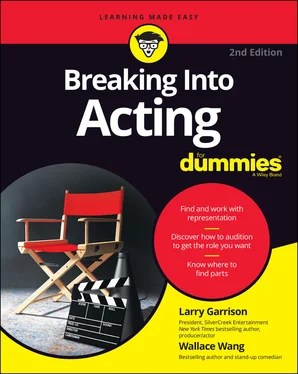Some people just happen to be in the right place at the right time when some Hollywood or Broadway producer spots them and suddenly decides to turn them into a star. Then again, some people win a million bucks in the lottery, too, so you don’t want to base your future on blind luck.
Unless you happen to become an overnight success (ignoring the fact that most overnight successes actually take ten years or more to happen), you’ll find that succeeding in acting requires persistence, dedication, and perseverance.
Perseverance means overcoming every obstacle that threatens to get in your way and blazing your own trail to success. Because you can never rely on blind luck or fate to bring you success, you have to actively hunt out success yourself. Chapter 7lists different ways that you can promote yourself in the world of show business and jump-start your career right now — wherever you happen to be.
David Grannis, Associate Professor, Director, Film, and Television at California Lutheran University said, “Undergraduate college and university acting students who study the Meisner technique, method acting, the history of theater, and set building also need to learn about the business of acting, which is essential if you want to work as an actor in the constantly evolving industry of film, television, and theater.”
Finding your first ally: An agent
Although you certainly can work as an actor for years without an agent by joining different online sites and submitting your resume, head shot, and stats, an agent can be more crucial in finding obscure roles that you may never hear about otherwise. We reference the different Internet sites in Chapter 7. An agent can also introduce you to casting directors who may be looking for someone just like you (if they only knew where to find you) and handle the business end of your acting, such as making sure that you get paid on time and making sure that you get paid as much as possible for your work.
Because an agent can help your acting career enormously, Chapter 8explains how to find an agent who may have relationships that you can benefit you. The agent can also negotiate big contracts and be there for your protection.
Showcasing your talent: Auditioning
The process of looking for an agent can teach you negotiating and cold-calling skills. Auditioning can teach you how to think and react quickly in unfamiliar environments and situations.
Because an audition (like a first date) can be your first (and sometimes only) chance to showcase yourself, Chapter 9explains how to maximize your chance of creating the best impression possible during every audition you attend. Chapter 9includes tips for what types of clothes to wear, how to prepare for any audition, how to behave during an audition, and what to expect during an audition. We also address how some of these various preparations will work with self-recorded auditioning at home.
Discovering the Many Ways to Make Money as an Actor
Starring in the next Broadway hit, Hollywood blockbuster, or Netflix series can make you rich beyond your wildest dreams, but what many actors don’t know is that you can make money as an actor in a variety of other ways as well, some of which can make you equally wealthy and famous, too. Here they are
Film and TV: Although you may not automatically star in the next box office smash or have your own sitcom, you don’t want to overlook the traditional acting routes of film and television. Chapter 12explains the feature film and television market, so you can use your knowledge to break into these highly lucrative markets right away.
Commercials: Appearing in a commercial can be another great way to get exposure, gain valuable acting experience, and possibly make a lot of money at the same time through the magic of residuals (also known as royalties), which is money actors receive every time their commercials appear on national television.Many famous actors, including John Travolta, got started in television commercials, which ultimately led him to television and, finally, feature films. See Chapter 13for more information on breaking into the commercial acting market. We discuss how commercials have changed in regard to unions and residuals and how to break in to this world.
Theater: Don’t forget this time-honored tradition! Chapter 14explains this prestigious acting market and what you can expect when performing in a play.
Voice-over acting: Watch any Saturday morning cartoon, animated feature film, or animated TV show (such as The Simpsons), and you’ll soon realize that many actors can make a great living just by acting with their voices alone. Best of all, voice-over acting relies strictly on talent and not on looks, which means that actors of all ages, backgrounds, and nationalities can find a wealth of opportunities open to them — no matter what their age or appearance may be. Go to Chapter 15for more on the hidden but lucrative world of voice-over acting.
Extra acting: Although being an extra won’t necessarily make you rich and famous, Chapter 16shows you how to use extra acting to help yourself break into show business from the inside. After you start working as an extra, you can peek behind the scenes to see how film and television acting works. You can also make invaluable contacts with directors and other actors who may be able to help you pursue your dreams of acting.
Roles for children: In case you have children, you may want to get them into show business as well. Peek at Chapter 17to see what types of acting opportunities may be available for your son, daughter, nephew, or niece. With a little bit of luck, your child may be able to earn their own money by appearing in commercials, films, TV shows, commercials, or theater.
Managing Money (A Little or a Lot)
As a beginning actor, you have to figure out how to juggle acting, earn a living, and handle your money all at the same time. To help you keep your money (and avoid losing it on show business scams that promise you success but only take your money and run), make sure to read Chapter 18. Con artists prey on actors, so this chapter can expose the more common con games and help you avoid wasting time and money on these scams.
Until you start earning a steady income from your acting career, you’ll most likely need a day job to provide you with a reliable source of income. Chapter 19explains different types of jobs suitable for actors who may need to take off for an audition in the middle of the day. This chapter also provides tips for looking for a job that provides the most flexibility and income, so you can focus your efforts on becoming a working actor.
 Acting is a completely unpredictable business. One moment you’re flooded with work, and the next few months (or years) may bring you no work at all. That’s why many aspiring actors pursue a second career. Not only does this choice provide a solid financial foundation so that they can live halfway decently, but it also gives them enough financial security so that a single rejection isn’t emotionally or financially devastating. If you’re too busy worrying about paying your rent this month, you probably won’t have enough energy to focus on becoming a better actor.
Acting is a completely unpredictable business. One moment you’re flooded with work, and the next few months (or years) may bring you no work at all. That’s why many aspiring actors pursue a second career. Not only does this choice provide a solid financial foundation so that they can live halfway decently, but it also gives them enough financial security so that a single rejection isn’t emotionally or financially devastating. If you’re too busy worrying about paying your rent this month, you probably won’t have enough energy to focus on becoming a better actor.
Chapter 20offers tips for managing your money wisely, from saving and investing your hard-earned cash to living frugally on a budget. We also give you some tips on ways to live cheaply (or even rent-free).
Knowing What to Expect from an Acting Career
At the very least, acting can expose you to interesting people, situations, and environments that you might never see otherwise. You’ll figure out how to face and conquer your fears of speaking before an audience, how to use your body and voice to present yourself to others, how to develop a thick skin to handle the inevitable criticisms that you’ll receive from less than adoring fans, and how to develop social and negotiating skills when searching for work and working with your fellow actors.
Читать дальше

 Acting is a completely unpredictable business. One moment you’re flooded with work, and the next few months (or years) may bring you no work at all. That’s why many aspiring actors pursue a second career. Not only does this choice provide a solid financial foundation so that they can live halfway decently, but it also gives them enough financial security so that a single rejection isn’t emotionally or financially devastating. If you’re too busy worrying about paying your rent this month, you probably won’t have enough energy to focus on becoming a better actor.
Acting is a completely unpredictable business. One moment you’re flooded with work, and the next few months (or years) may bring you no work at all. That’s why many aspiring actors pursue a second career. Not only does this choice provide a solid financial foundation so that they can live halfway decently, but it also gives them enough financial security so that a single rejection isn’t emotionally or financially devastating. If you’re too busy worrying about paying your rent this month, you probably won’t have enough energy to focus on becoming a better actor.










